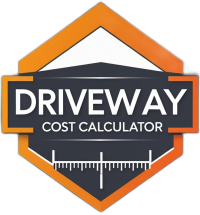Thinking about pouring a new driveway? Don’t just wing it—grab our concrete driveway cost calculator and spare yourself some serious headaches (and wallet pain). Seriously, it’s way better than guessing or asking your neighbor who “did his own” back in ‘92.
Concrete Driveway Cost Calculator
National Average Cost Reference
- Concrete: $150 per cubic yard
- Gravel: $50 per cubic yard
- Rebar: $2 per linear foot
- Labor: $50 per hour
- Waste/Overage: 10%
For a typical 16 x 40 ft driveway (640 sq ft), the total estimated cost generally ranges between $3,200 and $11,500.
How Our Concrete Driveway Cost Calculator Works
This concrete driveway cost calculator is designed to be simple yet comprehensive. Here’s how to get your concrete driveway cost estimate:
1. Punch in Your Measurements
Just type in the length and width of the driveway you want. Doesn’t have to be rocket science. The calculator does the math, figures out your total square footage, and tells you how much stuff you need. Easy.
2. Pick Your Thickness
Most people go with a 4-inch slab, but hey, maybe you’re parking a tank or your cousin’s monster truck. You can bump it up to 5 or 6 inches if you want. The calculator knows the drill.
3. Waste Not… Or Actually, Plan for Waste
Nobody’s perfect, especially not in concrete. Stuff spills, things get messy, so there’s a built-in 10% “oops” factor. Trust the process.
4. Enter What Stuff Costs Where You Live
You’re not paying LA prices in rural Oklahoma, right? The calculator starts with national ballparks (like $150/cubic yard for concrete, $50/cubic yard for gravel, $2/foot for rebar). But you can swap those out for your local rates. No surprises here.
5. Pick Your Reinforcement
You’ve got options. Want just perimeter rebar? Cool, that’s standard. Feeling fancy—or worried about earthquakes? Go for a full grid (but, heads-up, your rebar cost jumps about 50%).
6. Labor – Yeah, People Gotta Get Paid
Plug in your estimate for labor hours and what workers charge per hour. The default’s $50/hour, but, honestly, that number can be all over the place depending on where you live.
What Affects Concrete Driveway Cost?
Loads of stuff, honestly.
Size: Bigger driveway = more cash. Obvious, but people still ask.
Thickness: More concrete, more dough. And if you’ve got heavy vehicles, don’t cheap out here.
Prep Work: If you’ve gotta tear up an old driveway, move dirt, fix drainage, or the site’s a nightmare to access, those are extra costs. The calculator covers basics, but be ready for surprises.
Labor Rates: City prices vs. small town? Worlds apart. Always update the calculator for your local rates.
Fancy Finishes: If you want stamped, colored, or exposed aggregate, your price per square foot can double. Looks amazing, though. Just saying.
Concrete Driveway Cost Calculator FAQ
1. So, how spot-on is this calculator, really?
Honestly, it’s pretty decent—usually lands you within 10-15% of the real bill, as long as you punch in local material and labor prices that actually make sense. It’s definitely best for your run-of-the-mill, residential driveway. If you’re going all out with fountains and heated concrete, well, the calculator’s gonna shrug.
2. What’s missing from this calculator?
The basics are covered: concrete, rebar, and standard labor. But listen, there’s a bunch of stuff it just skips, like:
- Permits (yep, the city wants its cut)
- Fancy patterns or stamped finishes
- Drainage upgrades (because nobody likes a puddle)
- Hauling away your old, cracked driveway
3. Should I still get a bunch of quotes, even after using this calculator?
Heck yes. Treat the calculator like your starting point, not gospel. If a contractor’s bid is way off what the calculator told you, don’t be shy—ask them what’s up. Sometimes there’s a legit reason. Sometimes, well, not so much.
4. Can I use this calculator for other concrete stuff?
Sort of. It’s made for driveways, but if you’re pouring a patio or a shed slab, it’ll get you in the ballpark. Just make sure you tweak the numbers for the size and thickness—or you’ll be way off.
5. How often should I re-check my numbers?
Prices don’t sit still. If your project gets pushed back a few months, or it’s suddenly “concrete season” and everyone’s pouring driveways, run the calculator again. Stuff can get pricey fast.
Start Your Project Off Right
Look, a concrete driveway isn’t pocket change. It’s supposed to last you 25-30 years, so don’t wing it. Use the calculator to keep your budget from spiraling and to know what you’re getting into.
Surprises? Yeah, nobody wants those—especially not when it comes to bills. The calculator helps you dodge nasty shocks and gives you numbers you can actually use when talking to contractors.
So, ready to see what you’re up against? Bottom line—this calculator gives you a way better idea of what you’re in for before you start writing checks or arguing with contractors. Go ahead, crunch the numbers. Your future self (and your bank account) will thank you.
